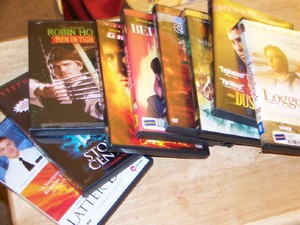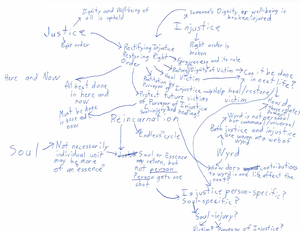 My own theological explorations can be quite focused. Specifically, I tend to focus on theological issues that are pragmatic and reflect on the here and now. Of utmost importance to me now is what it means to follow my gods today, to be a conduit for their blessings in the world around me, to build the proper relationships with others in my family, and similar such concepts.
My own theological explorations can be quite focused. Specifically, I tend to focus on theological issues that are pragmatic and reflect on the here and now. Of utmost importance to me now is what it means to follow my gods today, to be a conduit for their blessings in the world around me, to build the proper relationships with others in my family, and similar such concepts.
This focus on the hear and now means that I haven’t spent a lot of time thinking about what happens when someone crosses the threshold of death and walks out of this life. I’ve thought about it enough to know that I believe in virtually endless reincarnations that serve as a way to celebrate life and contribute to the unfolding of creation multiple times. I’ve thought about it long enough to ponder the nature of the soul and to wonder if a soul is an irreducible, cohesive unit or more of an ethereal essence. But that’s about as far as my thoughts on these matters have gone so far.
As a result, I was caught somewhat unawares when Matt Stone asked me about my beliefs on these topics over on his blog. He particularly focused on how I understood justice as it related to the next life:
I would ask though, what do you do with all the injustice in the world? What do you do with the fact that many people do not find justice in this life? What’s your response when a child abuser dies without repentance for his wrongs or restoration with those who he has wronged? Is there any consequence for our actions?
To be honest, I don’t feel that I can answer Matt’s questions at this
time. There are too many questions and theological concepts that I
would need to explore and come to understand — both individually and
in terms of how they relate to one other — before I could hope to
answer the particular questions Matt raised. So rather than answer
those particular questions, I will begin to do the necessary reflection
and exploration that I believe must come first. This post is my first
attempt to try and record that process of exploration in a way that
someone might be able to at least follow even if they don’t completely
understand it.
I have taken some time to consider my understanding of justice as it
applies to the here and now. As such, I will choose that as my central
starting point and work outward from there.
The heart of the concept of justice is the idea of right order. As the
universe continues to unfold, there are certain directions and ways in
which this unfolding takes place that is deemed good and proper. I
would characterize this right order by saying that when it is followed,
the basic dignity and well-being of all living things is honored and
upheld. Justice is the process or collection of processes by which
this right order is maintained. It also includes the process by which
that right order is restored when it has been violated.
Injustice, by comparison, would include any act or series of acts which
lead to the violation or break-down of this right order. In practical
terms, it would mean a situation in which the basic dignity or
well-being of someone is violated or denigrated. The examples of such
action are countless and can vary by the particular nature and general
degree of deviation from right order or the injury of the victims’
dignity and well-being.
The just response to injustice is to restore the right order. This
involves helping the victims of injustice to restore their dignity and
well-being. It also means taking right action in regards to the
purveyor of injustice.
That last statement deserves some consideration. What is the right
action in regards to those who would visit injustice upon others? The
most obvious answer is that they should be prevented from doing so.
This is especially true if there is reason to believe that they are
inclined to intentionally(1) continue to act as an agent of injustice.
In such a case, potential future victims must be protected, possibly by
isolating the agent of injustice from them.
Ideally however, agents of injustice should also be restored to the
right order of things as well. After all, they are as much a part of
this creation as anyone else. And in many ways, this restoration of an
agent of injustice is about healing as much as helping their victims
reclaim their dignity and well-being is.
Truth be told, disrupting the right order of things and hurting others
— especially when done intentionally and repeatedly — does terrible
things to a person. This includes soul-injury and the lessening of
themselves a human being. A proper understanding of justice cannot
ignore this fact, nor can it refuse to offer those who have degraded
themselves in such a way an opportunity to heal this damage they’ve
done to themselves.(2)
Ideally, injustice is dealt with as soon as it happens. The victims
are identified as well as how they were injured so that those around
them can help with the healing process. Those who are responsible are
also identified and prevented from doing further harm. If possible,
those responsible are also healed and restored so that they may again
become a part of right order and agents of justice.(3)
Unfortunately, as Matt points out, justice doesn’t always happen in the
lifetimes of those involved — victims and offenders alike. So it’s
natural to wonder if there is such a thing as justice beyond this (or
the current) life. And this is where I delve into shakier (for me at
least) territories, surrounded by partially answered and unanswered
questions.
Does an act of injustice live beyond the deaths of those involved?
Once those involved are dead, is there anything left that can be and
must be restored? Does the damage done to the victim somehow remain
beyond death to be healed? Does the damage the purveyors of injustice
caused themselves remain beyond death to be healed? Is there such a
thing as restoring someone to the right order posthumously? Is it
necessary?
I don’t ask these questions rhetorically. Matt’s questions assume that
the answers to some or all of those questions are yes. If the answers
to those questions are all no, there’s no point in talking about what
happens when people don’t find or are brought to justice before death.
So I find it necessary to search for answers to those questions myself.
So what happens when we die? Personally, I’m inclined to believe in
reincarnation. I believe that our soul is infinite and continues
beyond death, being born again in a new body with a new identity and
personality. I also believe that this is a virtually endless cycle,
with the rebirth in a new body being the desirable outcome.(4)
Since the soul continues beyond death, it is entirely possible and even
likely that some of the damage caused by injustice may live on in that
soul.(5) I have implied as much when I used the term “soul-injury”
earlier to describe the damage that an agent of injustice does to their
own soul through their actions. Such damage to a soul would manifest
itself during subsequent incarnations. As they surfaced, they could be
healed, remedying the consequences of the injustice.
Bonds between souls may also suggest a way that injustice may still
need to be resolved beyond the deaths of those involved. Injustice
often creates an unhealthy sort of bond between victims and those that
hurt them. This is why forgiveness and restoration of the agent of
injustice is so important. These acts provide a method for healing or
dissolving that unhealthy bond in the here and now. If that process
does not take place in the lifetimes of those involved and those bonds
are on the soul level, they may be carried over by those souls into
future incarnations. When this happens, they may create problems in
those subsequent lives. Again, these bonds can then be identified and
healed or dissolved at that time, remedying that consequence of
injustice.
A consideration of how wyrd relates to justice and injustice is also
appropriate. Every act contributes to wyrd, continuing to build and
shape our reality. As such, an act of injustice gets woven into wyrd
and the very fabric of our reality. This suggests both another avenue
for injustice to continue and a method for bringing it to resolution in
lifetimes beyond the one that introduced it.
It is entirely possible that the wyrd one weaves directly effects the
soul’s future incarnations. This could mean that two souls may not be
bound by an unhealthy soul-link forged in a previous life, but by a
wyrd-link forged in a previous life, or both. Again, this may require
addressing the past injustice in terms of once again removing this
intertwining of two soul’s respective parts of the fabric of wyrd.
It is also noteworthy to consider that wyrd is not individual, but
universally shared. There is not “my” wyrd, “your” wyrd, or “his”
wyrd. There is merely wyrd, the common reality that we are
collectively shaping through our individual actions. The implications
of this fact are important when discussing justice and injustice.
When an injustice occurs, it becomes a part of wyrd and therefore a
part of everybody’s reality. This means that on the level of wyrd, an
injustice ripples outward along the fabric of reality, effecting more
than those victims and agents of injustice that are immediately
involved.(6) The longer that the injustice goes unanswered, the further
those ripples travel.
In order for an injustice to truly be rectified, these ripples must
also be addressed. Until all the negative implications of an injustice
have rectified, full justice has not taken place. This provides
another way in which an original injustice may live on after the death
of those originally involved.
It is entirely possible that some mechanism could effectively place a
reincarnated soul of someone involved in the original injustice in a
position to rectify a ripple that has traveled long and far. This
could offer further opportunities for both the restoration of a soul
that was previously an agent of injustice and healing for soul that was
previously victimized.
Wyrd and reincarnation both offer many ways in which injustice may
outlive those who were involved in it. They both also offer ways in
which the reincarnated souls involved in a past injustice could be
healed, restored, and otherwise involved in the process of ultimately
rectifying all aspects of the injustice. I do not claim to know
exactly which of these mechanisms actually come into play or how
exactly they work. That will take much further reflection and
consideration. However, I hope I have described some directions that
reflection and consideration may follow.
(The image include in this post is a scan of the cluster-map that I
drew out when I originally began to think about this topic. I included
because comparing it to this post may prove interesting and even
instructive.)
NOTES:
(1) It’s important to note that human beings are imperfect and that
even the most well-intentioned, loving person is bound to cause some
(hopefully small) amount of injustice at times. A proper understanding
of justice cannot ignore this and focus only on the “big” instances of
injustice or even those instances of injustice that were intentional.
However, it’s also important to note that a moral person who hurts
another even intentionally is most often an effective, willing, and
even eager agent of justice in such situations. That is, they are
quick to do what they can to repair the damage that they have done.
This is different from someone who hurts others with no regard for what
they’ve done (sadly, this includes those who would use the fact that
they “didn’t mean to hurt anyone” to excuse their actions) and would
continue to do so.
(2) The thing to remember here is that one cannot heal or restore one
who does not want to be healed or restored. Some people simply want to
remain as they are, soul-debilitating pock-marks included. In such a
case, no one can ultimately help them unless and until they change
their mind. It is merely our job as just people to always be open to
the possibility that they will change their mind and be ready to offer
and even help with their restoration should it ever happen —
protecting ourselves and others from the harm they might bring about in
the meantime.
(3) In my opinion, one of the most powerful tools of the restoration
process is to actually have those who caused the hurt to help be part
of the healing process for those they have hurt. It is one of the most
powerful ways to take responsibility for ones actions and even directly
rework the contributions to wyrd they have made through their unjust
acts.
As a tangential aside, this is why I often feel there is more real
justice in America’s civil tort system than in its criminal justice
system. While the latter’s only real merit seems to be in separating
wrongdoers from society so they can’t do any harm, the former gives the
opportunity for those injured to get monetary compensation, which can
then be used to seek help in emotional healing, pay medical bills, and
otherwise try to “pick up the pieces.”
(4) Indeed, Gerald Gardner wrote in his books that the central point of
the witches’ rituals was to influence the reincarnation process,
ensuring that those working together would again be reborn in the same
time and place as one another. Personally, I think Mr. Gardner was on
to something there.
I do want to take a moment, however, to make one thing perfectly
clear. I find myself with a similar outlook to Gardner and Gardnerians
in general on many different topics. As such, I often reference what
he or other Gardnerians have written and said as a way of communicating
my own ideas. However, it would be a mistake for the reader to assume
that I am a Gardnerian witch myself — as some people have in the
past. I am not. I wish to clear up that possible misconception, as I
do have many wonderful Gardnerian friends who I respect deeply, and I
would hate for them to hear (however incorrectly) rumors that I am in
any way claiming to belong to their tradition. They have enough people
doing that as it is, and I know how angry it makes them — and
understand why!
Also, I also value my own integrity too much to allow people to get the
idea that I’m something I’m not, even if unintentionally.
(5) One of the other things that I have considered is the nature of
souls. At times, I often wonder if souls are not quantum units, but
pools of an essence. The latter suggests that one dies, rather than
one’s whole soul moving onto another body, the pool of essence could
actually split into many rivulets and/or co-mingling with other pools
and rivulets. The idea here is that one doesn’t have so much a soul as
“soul-stuff.”
I bring this up because the idea of damage to a soul seems to assume
the quantum unit view of souls. I’m not sure that a pool-of-essence
model lends itself as well to the idea of soul-injury. As such,
further consideration of the nature of the soul could require renewed
examination of the ideas I’m exploring.
(6) The most obvious examples of this rippling process when one pays
close attention to how a person’s past experiences color their present
choices and relationships. I know I’ve personally made some bad
choices in life based on unhealed past hurts. And I have no doubt that
those bad choices have in turn affected how other people affected by
them have made choices in their own lives.









